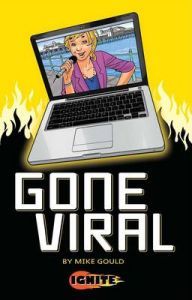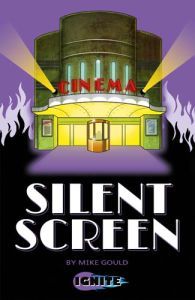Mike Gould
He likes playing the guitar, piano and football – though preferably not at the same time.
He has three children, a wife who patiently listens to his ideas, and a mad dog called Fred who keeps on running away.
Q&A with Mike Gould
What inspired you to write for reluctant readers?
I was an English teacher before I became a writer, and I realised that there was a real shortage of engaging stories for reluctant readers, especially ones with an 'emotional heart'.
What challenges do struggling readers face when they open a book?
For many of them, the words can seem like a blur...almost a foreign, or at least alien, language. They might also lack the habit of reading...the simple fact of a story with a developing narrative as you turn the page.
What is your favourite type of character to create?
I like writing about brooding, arty types – characters who might be considered outsiders, or who are prepared to follow their own instincts rather than the crowd.
What features and methods do you use to ensure that your books have that High Interest appeal that really engages young readers?
For me, I tend to focus on recognisable characters but ones who are thrust into unusual, or original circumstances. I also aim to give a sense of satisfaction in the ending...a sense of completeness, without making the story predictable, if possible. I also try to establish basic characterisation quickly, so that readers get an immediate sense of how one character might differ from another, for example in the things they say (e.g. making silly comments, or being the one who lacks confidence...). This way, less confident readers have some straightforward 'pegs' to hang the story on as it progresses.
What difference do books like these make to children who are in need of literacy support?
I think they make them feel they have access to the sometimes secret or arcane world of literacy and literature – they are reading real stories by real authors, not completing language exercises (however useful those are). Good stories are also paradigms of the real world, ones against which they can test and try out their own feelings and ideas. The brevity of the stories also encourages imitation and emulation – most children have their own stories or anecdotes shut away in the mind's locker, and these can be released, recounted, performed, and written in response to these shorter texts.
Can you give us any teasers of what to expect in Silent Screen?
Well, if you mix an abandoned old cinema, movie stars from the past, and a very curious teenager – then that'll give you a clue!
What are the major themes of your work?
I'm interested in the idea that everyone has a passion for something, or is creative in some way; sometimes that can be turned to good, sometimes used for bad – it's about unpicking the secret life of characters and their inner motives. Linked to this is the theme of how particular places (an old pier, a deserted cinema, a marshland cottage etc) can act like magnets for such characters. Take an outsider and add him or her to one of these places and, hey, you have a great story!
What controls do you place on the vocabulary you use and how important is this?
It depends on the specific level the story is pitched at, but in general there will need to be a proportion of high frequency words, and where words are more ambitious or complex (in terms of spelling), they might be ones they hear or come across regularly in speech, if not in print.
What is your favourite children's book?
Hmm. Very difficult to say! I remember loving Gerald Durrell's 'The Donkey Rustlers', set in Crete, which I read about ten times when I was about 11 years old, but I also love SE Hinton's 'The Outsiders' about kids from the wrong side of town. They have these great names – 'Ponyboy', 'Sodapop', 'Two-bit', and so on. I'm also a great fan of Robert Westall's 'Gulf' set during the first war against Iraq, about an English boy whose experiences begin to mirror those of an Iraqi boy suffering in wartime. Powerful stuff!
Do you have any advice for aspiring writers/authors?
Stories are all around you – whether you live in a village, town or city. Think of where you live like a film-set and soon those stories will start materialising in front of your eyes. One other thing – finish stuff off! There's a saying that everyone has a book in them. This may be true, but you can't think stories into being – you have to actually start them, develop them – and, most important of all, finish them.
Speak to our team today on 01553 816082 or if you would prefer us to call you back then please enter your details in the form below and a member of our team will call you back.






